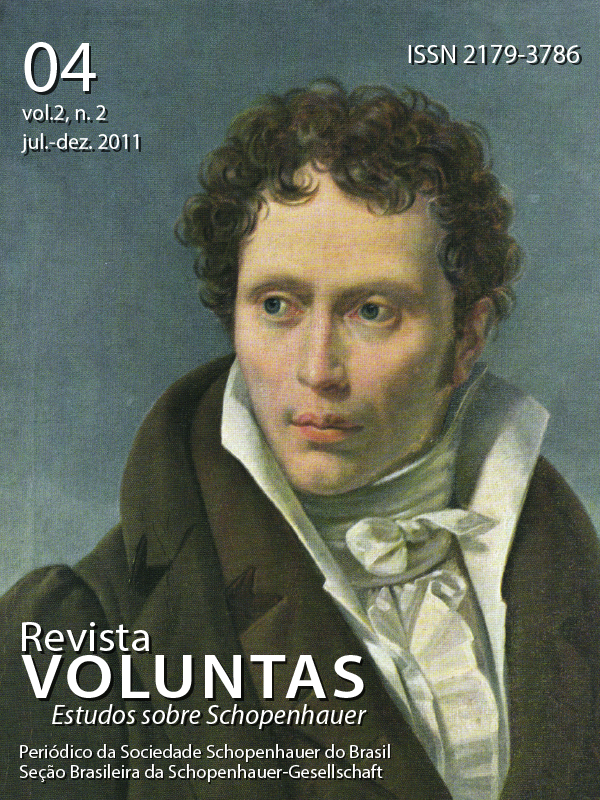Moralidad y felicidad en Schopenhauer y en Kant: conciertos y desacuerdos
DOI:
https://doi.org/10.5902/2179378634087Palavras-chave:
Moralidad, felicidad, eudemonismo.Resumo
En este trabajo nos proponemos explorar la problemática relación entre moralidad y felicidad en las ópticas de Kant y Schopenhauer. Nos centraremos en la recepción crítica por parte de este último de ciertas concepciones kantianas concernientes a la moralidad y la felicidad, intentando evidenciar los aspectos en los que les presta su consentimiento como así también los de rechazo explícito. Para abordar esta relación crítica entre ambos filósofos, tomaremos como punto de referencia dos afirmaciones aparentemente contradictorias del mismo Schopenhauer, a saber: que Kant posee el gran mérito de haber destituido el eudemonismo de la ética, por un lado; y que esta destitución ha sido, no obstante, más aparente que real, por el otro.Downloads
Referências
ANSCOMBE, G.E.M. “Modern Moral Philosophy”. En: Philosophy, Vol. 33, 1958, pp. 1-19.
EPICURO. Obras. Trad. M. Jufresa. Barcelona: Altaya, 1997.
GUARIGLIA, Osvaldo. “Eudemonismo y Virtud en la Ética Antigua: Aristóteles y los Estoicos”. En: Revista Diálogos 80, 2002, pp. 1-47.
ENGSTROM, S. “Happiness and the Highest Good in Aristotle and Kant”. En Engstrom, S. (et al.) (eds.), Aristotle, Kant and the Stoics: Rethinking Happiness and Duty. Cambridge: Cambridge University Press, 1996, pp. 102-138.
HERMAN, Barbara. “Rethinking Kant´s hedonism”. En: Facts and Value. Essays on ethics and metaphysics for Judith Jarvis Thomson. Massachusetts Institute of Technology Press, 2001.
IRWIN, Terence. “Prudence and Morality in Greek Ethics”. En: Ethics, Vol. 105, N° 2, 1995, pp. 284-295.
IRWIN, Terence. “Kant´s Criticisms of Eudaemonism”. En: Engstrom, S. (et al.) (eds.) Aristotle, Kant and the Stoics: Rethinking Happiness and Duty. Cambridge: Cambridge University Press, 1996, pp. 63-101.
KANT, Inmanuel. Fundamentación de la metafísica de las costumbres. Trad. M. García Morente. Madrid: Tecnos, 2005.
KANT, Inmanuel. Crítica de la Razón Práctica. Trad. J. Rovira Armengol. Buenos Aires: Losada, 2007.
KANT, Inmanuel. Antropología en sentido pragmático. Trad. M. Caimi. Buenos Aires: Losada, 2009.
KANT, Inmanuel. Crítica de la Razón Pura. Trad. Pedro Ribas. Madrid: Gredos, 2010.
RAWLS, John. Lecciones sobre la historia de la filosofía moral. Barcelona: Paidós, 2001.
SCHOPENHAUER, Arthur. El Fundamento de la Moral. Trad. Vicente Romano García. Buenos Aires: Aguilar, 1960.
SCHOPENHAUER, Arthur. Escritos Inéditos de Juventud 1808-1818. Sentencias y Aforismos II. Trad. y Selec. Roberto Aramayo. Valencia: Pre-textos, 1999.
SCHOPENHAUER, Arthur. El Mundo como Voluntad y Representación. Vol. 1. Trad. Roberto Aramayo. Madrid: FCE, 2005.
SCHOPENHAUER, Arthur. El Mundo como Voluntad y Representación. Vol. II. Trad. Roberto Aramayo. Madrid: FCE, 2005.
SCHOPENHAUER, Arthur. Parerga y Paralipomena I. Trad. P. Lopez de Santamaría. Madrid: Trotta, 2006.
VLASTOS, Gregory. “Happiness and Virtue in Socrates´ Moral Theory”. En: Socrates. Ironist and Moral Philosopher. Cambridge, Cambridge University Press, 1991.
WILLIAMS, Bernard. Ethics and the Limits of Philosophy. Abingdon: Routledge, 2006.
WOOD, Allen. “Kant versus Eudaimonism”. En: Kant´s Legacy: Essays in honor of Lewis White Beck. Rochester: University of Rochester Press, 2001, pp. 261-281.
Downloads
Publicado
Como Citar
Edição
Seção
Licença
A submissão de originais para este periódico implica na transferência, pelos autores, dos direitos de publicação impressa e digital. Os direitos autorais para os artigos publicados são do autor, com direitos do periódico sobre a primeira publicação. Os autores somente poderão utilizar os mesmos resultados em outras publicações indicando claramente este periódico como o meio da publicação original.
A Voluntas é um periódico de acesso aberto sob a licença Creative Commons Atribuição-NãoComercial-CompartilhaIgual 4.0 Internacional (CC BY-NC-SA 4.0).






